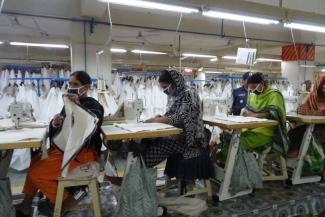SPD
Focus on poverty reduction

The waves of refugees and migrants produced by current crises confirm the need to pursue the overarching objective of our global structural development policy: a life in dignity for every person on the planet. Among other things, this means realising the Agenda 2030. Additionally, we want to implement the National Action Plan on Business and Human Rights in a much more ambitious way than it has been possible in the coalition government with the Christian Democratic Union. The EU’s economic partnership agreements need to be more development-friendly, and compliance with social, environmental and human-rights standards must be compulsory. Our goal is to move from free trade to fair trade.
The Federal Government’s current engagement in Africa focuses far too much on business investment. Africa is three times the size of Europe and has a population of 1.2 billion. Its problems cannot be addressed by one single plan. A needs-based focus and regional differentiation need to find their way into development politics again. Fragile states and least developed countries still urgently need government funding. We will also reemphasise the need for poverty reduction instead of promoting investment opportunities for (German) companies in Africa.
We have only 13 years to implement the 17 goals of the Agenda 2030. That is very little time. The Chancellery seeks to implement the Agenda merely by updating the National Sustainability Strategy – cherry-picking without even defining the status quo and targets. More needs to be done. However, it is not the sole responsibility of the Federal Ministry for Economic Cooperation and Development (BMZ) to implement the Agenda 2030. Instead, its implementation needs to be steadily managed right across the government.
Whether they work on small-scale farms or in manufacturing sectors, women account for the lion’s share of economic output in partner countries. Utmost importance needs to be attached to the promotion of women. Education – the cornerstone of development – needs to be focused on women and girls, including support for reproductive and sexual self-determination.
In view of global climate change and rising energy demand driven by population growth and other factors, we support the systematic promotion of renewable energies and the creation of decentralised, democratically controlled supply systems. Urbanisation is a major issue here, since 70 % of global carbon emissions are generated in urban areas. Thus, we intend to step up support for the fast-growing cities of the global south through twinning agreements. We also aim to provide special support for poorer countries at risk of climate change.
Time and again, we observe that German and European development programmes in countries of the global south conflict with or at best blindly duplicate each other. EU programmes, national government programmes and the diverse activities of private organisations and foundations need to be better coordinated. Coherence is a well-worn word but we will not shy away from tackling these difficult issues.
The special initiatives of the BMZ have given rise to a considerable amount of irritation and confusion in the field of development cooperation. Projects receive only annual financial commitments. This is not how sustainable development cooperation can be accomplished. The BMZ needs to stop doing things for the sake of doing things and start being a reliable partner for developing countries and implementing organisations.
No one doubts that the BMZ possesses extensive expertise but at present that expertise is being stifled. The leadership has completely lost touch with its own staff. Plans are no longer drawn up internally, and on foreign trips knowledgeable staff members are replaced by journalists and photographers. But without internal expertise, the professional competence of a leadership declines. It is the team that wins, not the top manager.
Stefan Rebmann is spokesman of the Economic Cooperation and Development Working Group of the SPD parliamentary group.
stefan.rebmann@bundestag.de






